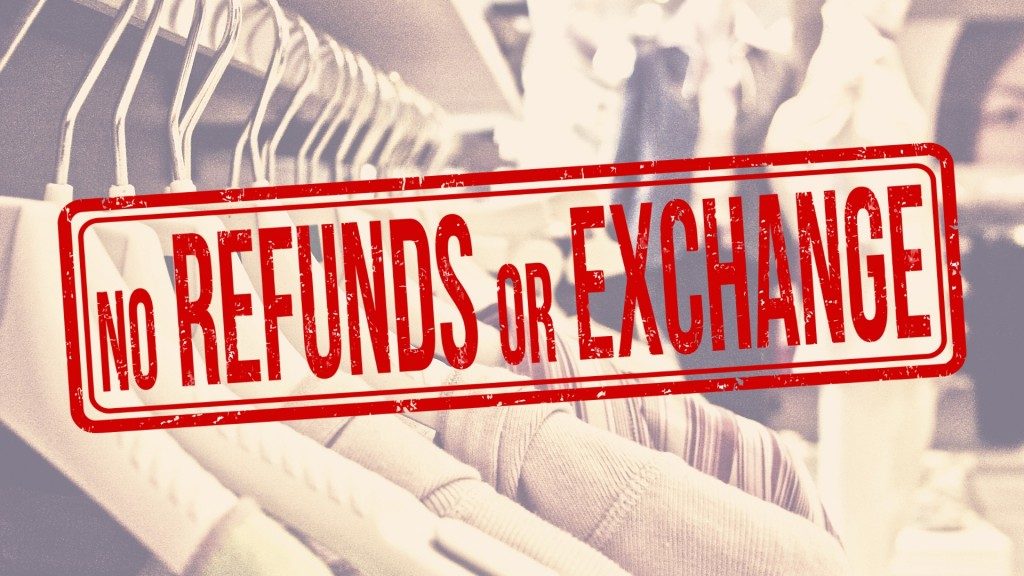
Published 03 December 2018, The Daily Tribune
The holidays are fast approaching! Have you prepared your Christmas shopping list? And have you scouted where the Christmas bazaars are? In this season of giving, shopping centers, marketplaces, retail outlets, bazaars, flea markets and fairs, abound. And being the typical Filipinos that we are, we cannot but resist to purchase presents or groceries and other goodies in time for the Christmas festivities.
Suppose that after the hustle and bustle of Christmas shopping, you discover that the shelf life of the purchased canned goods had already expired, or other bought items are defective, can you have them returned or your money refunded instead? What if the source business establishment posted a “No Return, No Exchange Policy”?
By all means, you can have your defective purchases returned, or money refunded. A No Return, No Exchange Policy is expressly prohibited under the law. Under Republic Act No. 7394, otherwise known as the “Consumer Act of the Philippines,” as well as its Implementing Rules and Regulations, it is specifically mandated that the words “No Return, No Exchange” or words to such effect shall not be written into the contract of sale, receipt in a sales transaction, in any document evidencing such sale or anywhere in a store or business establishment.
Note that a “No Return, No Exchange” Policy is prohibited because this is considered deceptive. Under the Consumer Act, in conjunction with the New Civil Code of the Philippines, sellers are obliged to honor their warranties and grant corresponding remedies to consumers. As such, consumers should be allowed to return or exchange the goods, or avail themselves of other remedies, in case of hidden faults or defects, or any charge the buyer was not aware of the time of purchase.
By warranties, we mean the assurances or representations of a seller to a buyer with regard to the product or good sold. These warranties may either be express or implied. Express warranties are those explicitly made known to the buyer, usually contained in a warranty card which specifies the guarantees to the buyer in clear and understandable language. These express warranties must, at the very least, contain the name of the warrantor and the warrantee, the specific parts or services warranted, the extent of the warranty (full or limited), duration, procedure for claiming against the warranty and the remedies of the buyer in cases of malfunctions or defects.
Implied warranties, on the other hand, refer to those which are inherent in a sale transaction. Under our New Civil Code, a seller shall be responsible for warranty against hidden defects which the thing sold may have, should the defect render it unfit for its intended use, or if the defect diminishes its fitness for such use to such an extent that, had the buyer been aware thereof, he would have bought the thing sold for a lower price, or simply, withheld the purchase. In fact, the seller shall be liable for this implied warranty notwithstanding that he himself is unaware of the hidden defect(s). On the other hand, should the defect be so patent or obvious, the buyer cannot be allowed to make the seller answerable for the same on the ground of fairness.
In general, in cases of breach of the seller’s warranties, the Consumer Act entitles the buyer to choose any of the following alternative remedies: (a) repair of the product, in whole or in part; (b) replacement of the product with a like or equivalent product; (c) refund of the purchase price of the product less a reasonable allowance for use; or (d) payment of reasonable damages.
In enforcing these remedies, however, bear in mind that you must at least prove the sale transaction. Obviously, the official receipt is the best proof of the transaction. In cases where the official receipt is not available, the buyer may resort to any other alternative proof.
This “No Return, No Exchange” policy only refers to those goods which, at the time of the sale, had hidden defects or imperfections. Hence, it cannot be availed of where the defect of the goods was due to the mishandling of the buyer, or in cases of “as-is-where-is” transactions, or in sale of second-hand articles. Much less, the buyer cannot demand return or refund because he had a change of heart.
As a final note, while the laws provide remedies in cases of sale deceptions or deficiencies or irregularities, the best protection is almost always, prevention.
Hence, a word of caution this season: Christmas Shopper, Beware. Examine your purchases. Check the expiration date of the product, test it out, and physically examine for defects. Check the warranties, if any. Always ask for an official receipt, and more importantly, keep it. Ask for the allowable period for the return or exchange or refund of the item bought. And finally, know your consumer rights, and keep them handy.
So without further ado, go forth and have a merry and worry-free holiday shopping!
For comments and questions, please send email to cabdo@divinalaw.com

